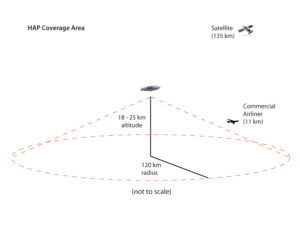Three companies deploying novel connectivity described multiple opportunities in emerging markets during a webinar co-hosted today by satellite trade association GVF and Connectivity Business News that was moderated by Quilty Analytics senior analyst Caleb Henry.
Avealto, high altitude platform (HAP) provider for telecom services, has terrestrial Ku-band licenses in some countries “on a non-interference basis,” Walter Anderson, Avealto founder and CEO, said in the webinar.
While HAPs must go through the spectrum coordination process of the International Telecommunication Union (ITU), they have a lower priority then the satellites that preceded them, Anderson said.
“The ITU has not allocated any realistic frequencies … that would work in tropical areas,” Anderson said. “But the individual countries that we’re working with are willing to set [spectrum] parameters that we have to operate in on a non-interfering basis. We don’t want to damage the [satellite companies] that are going to be our partners — and we’re also providing service to customers.”

Founded in 2013, Avealto deploys lighter-than-air vehicles about 12 miles in the air, from which they offer coverage approximately 149 miles in diameter. “We’re not going to cover the entire Earth: satellites are still going to be part of the equation,” Anderson noted, adding, “but in the areas we select to cover, we will be the lower cost provider” as well as deliver superior latency.
Meanwhile, smallsat GEO specialist Astranis, which already has a deployment over Peru, is offering quality connectivity, Christophe Bauer, vice president of commercial sales, said in the webinar. “In my discussion with cellular operators in particular, cost is not the only driver — quality of service is very, very important.”
Specialist satellite constellation builder Omnispace, which last month announced partners for its global 5G IoT network, sees the resilience of satellite connectivity as its differentiator. The company anticipates increasing demand and a proliferation of applications as the latest 5G standard, 3GPP Release 17, which incorporates non-terrestrial networks (NTN), is deployed to users and devices around the world, Brian Pemberton, vice president of sales and marketing for the company, said in the webinar.
Omnispace plans to deploy “multiple hundreds” of satellites he said. Asked by Quilty’s Henry for specifics, Pemberton said that “it will be a fairly substantial constellation” but “certainly not the scale of some of the mega constellations … with their thousands of satellites.”
Connectivity Business Summit, taking place June 14-15 in New York City, will explore the critical strategic and financial issues impacting the global satellite and terrestrial connectivity infrastructure and services industry. In addition to hearing top leaders share their experiences, attendees will take away new insights and invaluable connections. Learn more about the event.









